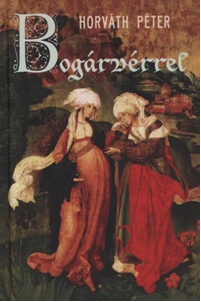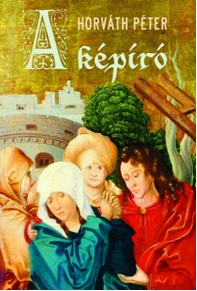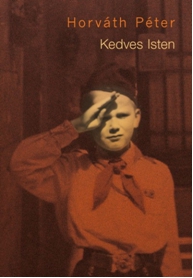
Péter Horváth DLA
Born in Budapest, Hungary in 1951. Peter Horvath started his career as an actor. When his first book was published (1976) he gave up his original profession. From this time he works as a freelance writer and director. He has written short stories and novels, theater plays, films and audio dramas as well. Directed more than 25 plays and musicals in several Hungarian Theaters, directed many audio plays as well. His audio dramas have been translated in several languages. His radio play "Ciao Bambino" won the price of best script at the audio drama contest Morishige Award 1991 in Tokio. He has been teaching creative writing at universities for ten years.
LATEST BOOKS:
BLOOD OF BUGS

It’s an exciting story about an orphan child taken in a monastery for growing him up. He works there as a servant in the garden. Everybody thinks that the limping boy having a cleft palate is a woody, stupid somebody. But he learns to write and read. Using blood of bugs as ink he writes a diary for remembering everything has happened around him. He would like to recognize what he lives for, what God wants him to do. The votaries recognize that he can remember everything he has ever seen or heard so the Prior starts to use him as a spy in the town. In this time (the middle of the fifteenth century) the way of life starts to change. Especially in the free towns belong under the king’s authority in Hungary. The traders get to be richer than the mine-owners, so new groups of people want to get a part of power. Everybody straggles against everybody. They know that the King Mathias will die before long, but don’t know who the new king will be? It can be the Mathias’s stepson or his wife or the German-Roman Kaiser or the Sarmatian King’s son…Who should you support? There has been a hard contra entry between the rich catholic church and the poor monastery for a half century. The reverends and the votaries also would like to get more own believers and more support as well. The Prior would like to renovate the old ruinous church of the monastery, so he has to know who “the man of future” is in the town to league with him or them. He sends his servant to serve to the houses of rich inhabitants for spying their wills. In the end the boy understands what kind of roll he has to play by the Prior’s orders. He falls in a strange love with the richest girl in the town and he has to tell everything he new about her family… He tries to commit suicide… When the King Mathias dies a war starts. Using the information of his servant, the Prior supports the Sarmatian King’s son. He will be the King, so the Prior gets a possibility to start to renovate the old church. He sends his servant to go abroad because he wants to throw him off, the witness of his doings… You can read this novel as a political crime story or a tale about the faith in the middle ages or nowadays. Its question is: how to live, how to find your own way among the possibilities and impossibilities as well.
DZSORDEN

Dzsorden, the orphan Hungarian gipsy boy has never known his parents. His mother died while giving birth to him. His gipsy grandma started to bring him up at the end of a small village lived by very poor people. The grandma doesn’t have any work she steals several things for the little child. She will be arrested and taken to a prison. Dzsorden gets in an orphanage. He inherited a photo about three US soldiers who are embracing her beautiful mother with a great smile. One of these soldiers is black. Dzsorden thinks that this man can be his father. If it’s true, it means that he has to be American, not a gipsy. He decides to find his black father and to leave the country where everybody hates the gypsies. He grows up in several orphanages and boarding schools. He is seventeen years old when he gets a chance: he can attend a very good secondary school in a town situated not far from the small village where he was born. This village gave a flying field for the American army at the time of the Serbian war. Dzsorden’s mother worked there as a maid and as a whore as well. Dzsorden traces the name of the black soldier. But how could he get to the USA? The secondary school gives the chance: the best students can set out on a journey to the USA after their perfect final exams. Dzsorden asks one of his class mates to help him to learn better. This classmate is a girl belonging to another minority, she is Jewish. Her father is a large views professor in a local university, he brings up his daughter alone, because his wife left them and moved to Israel. The young girl has never forgiven her mother and never sent an answer for her letters from Israel. The gipsy boy falls in love with the Jewish girl. The girl will be pregnant. His father feels shame. He is not able to imagine to have a gipsy grandchild. The girl asks help from her mother. The mother comes and takes her to live in Israel. Dzsorden doesn’t know what has happened to the girlfriend. Her father doesn’t want to speak to him at all. Dzsorden swindles in his exam, and is nabbed. He doesn’t know what to do. He visits his grandmother. The old gipsy lady has been in a jail for years again. She gives money to him for buying an air ticket to USA. Dzsorden flies to New York, finds his father who has a great family with black children so he doesn’t want to have on other “white” one, but he promises to help him to stay in the USA. Dzsorden gets a message from his “father-in-low” and learns that he has a child in Israel… The professor asks him to bring his daughter and grandchild home… Dzsorden should make a decision what to do. To stay in the USA being a disliked step child or to try to be a gipsy father of a Jewish baby at home… Or just let all questions fall from the twentieth floor window with himself together… How would you decide if you were in his shoes? The novel talks about one of the hardest question of the Hungarian society…
THE LIMNER

This novel is the continuation of the story of a previous book about a young servant who would like to learn what his destiny was, what God wants him to do. We left him abroad where he gets the Prior’s new order. He wants him to meet a limner who is invited to paint great paintings in the renovated church of the monastery. The servant should lead the limner from German land to the Hungarian town. But before the meeting the servant is supposed to visit a famous doctor in Krakow to undergo an operation. As we mentioned, the young man has a hare-lip, which causes speech difficulties and makes his face to look strange as well. The servant finds the doctor who cuts out his tongue. The mute young man thinks the Prior ordered the doctor to cut his tongue out, so he doesn’t want to go back to the monastery, so he goes up to a hill to live there alone as a hermit. But how life tricks him – or what the author wants to play – one year later he meets the limner in the hills. The limner is a strange man in his fifties. He is said to be a very talented painter but doesn’t want to become famous in spite of his talent. As a child of a minor he ran away from his hated future, travelled all around Europe to learn to paint from the best masters of the early Renaissance. He thinks that the world is beautiful enough without his adding anything to it. But this opportunity – the invitation to paint the old church of his hometown – woke up his ambitions. The fight between the Catholic church and the monastery in the town goes on, so not everybody is looking forward to the arrival of limner. He and the mute servant arrive to the town together. The limner likes the mute young man who admires him. The limner paints in a mood that nobody likes but the pictures are as beautiful as nobody have seen before… The whole story is too complicated to tell it in some sentences. All the characters we like and love will die in the end but the new paintings are still alive to preach that life is beautiful…
Dear God

There are two parallel stories… A ten years old child (Tibor) and his younger brother (Sándor) get to a boarding school in 1960. Their father has been imprisoned because taking part in the revolution in 1956. Their mother lost her job, doesn’t have enough money to support her sons. The children don’t know the relationship between these events, they don’t understand why their mother took them there. This boarding school is a terrible place where the older boys terrorize the younger ones. The teachers and the head of the boarding school try to make their students to become enthusiastic young communists. Tibor is suffering. A classmate of his tells him about God who can help everybody. Tibor starts to write letters to God saying about the circumstances of his life, about his dreams and wishes, too. He is waiting for help from God who can rescue him and his brother from the boarding school. The other story line is telling about the fate of the children’s father, about the revolution in a provincial town. This story is based on a real story… There is a hard moment when the father turns to God for his help as well…
Somebody helps him.
We don’t know exactly who does.
If you have some questions or want to write to me, use the following address, please: irohorvathpeter@gmail.com